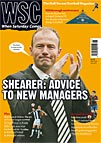 Bruce Wilkinson looks at government attempts to control how football tickets are sold
Bruce Wilkinson looks at government attempts to control how football tickets are sold
Football supporters are making a growing number of complaints about the ticketing industry and the huge expansion in secondary sales. In response the Department of Culture, Media and Sport has combined with another clumsily titled ministry, that of Business, Enterprise and Regulatory Reform, to produce a consultation paper on the issue. Modern technology has revolutionised ticket buying in many positive ways, such as giving a wider range of purchasing and payment options, but it has also democratised touting on an unprecedented scale. This ranges from supporters buying extras in order to make a bit of cash to organised gangs hoovering up blocks of seats and agencies offering big match entrance at extortionate rates. Internet-based auction sites have radically changed resales, giving the opportunity to make a quick buck to anyone with good broadband access and limited scruples. As a consequence, legislation is struggling to keep pace.
Readers of a certain age will remember touts as overweight blokes with strong regional accents and the haggling skills of a souk stallholder. The internet has changed both the way tickets are sold initially and through what is now called the “secondary market”. The early morning cup ticket queue now seems a quaint ritual of a bygone age. Most clubs now have dedicated telephone lines, many give the option of buying directly through websites while some no longer even have ticket offices.
The Violent Crime Reduction Act of 2006 made football touting illegal, but its recommendations now look dated as the pace of change increases. The new consultation paper invites opinions from all interested parties, setting a deadline of May 15 for responses. Sports Minister Gerry Sutcliffe, in his introduction, comments that: “Efforts are being made to ensure tickets go to real fans rather than to those who want to re-sell at a profit.”
The government want the market to adopt clear principles and retains the right to restrict sales to events that are of “importance to the nation”. It also wants to standardise the option of refunds for games which have been moved to different days or times, asks whether clubs might be prepared to return booking fees as part of that, and encourages the growth of official exchanges.
Legal exchanges show how technology can work positively for supporters, offering the chance to sell spares or to get a seat at face value without feeding the black market. Several of the biggest English clubs including Manchester United, Chelsea and Arsenal offer official services through Viagogo and Seatwave websites. The government wants many more clubs to adopt the system.
A recent review by the Office of Fair Trading (OFT) shied away from further legislation and recommended voluntary guidelines and the current consultation paper also indicates a desire only to set out principles around which companies should work. It sees bodies like the Society of Ticket Agents and Retailers as beacons of good practice and wants organisations to sign up to its criteria of their own volition. This is what the OFT recommended in its 2006 report, which was largely ignored by the market. One wonders why anyone would expect the reaction to be different this time.
There is cause for concern in the fact that the government is looking to promote ideas currently used by the entertainment industry, such as including purchasers’ details on tickets, the requirement of photographic ID and the cancelling of tickets when rules are broken. Although efforts to reduce profiteering should be applauded, examples like the 2008 Glastonbury Festival, where a stringent registration scheme had to be relaxed to sell out the event, are a warning that simply making ticket sales difficult isn’t necessarily the answer. Football supporters fought long and hard to beat the Thatcher government’s ID card scheme of the late 1980s. Just as many people are now engaged in the battle to prevent a universal British identity card. There is still a possibility that football could become a backdoor aid to its introduction.
From WSC 267 May 2009